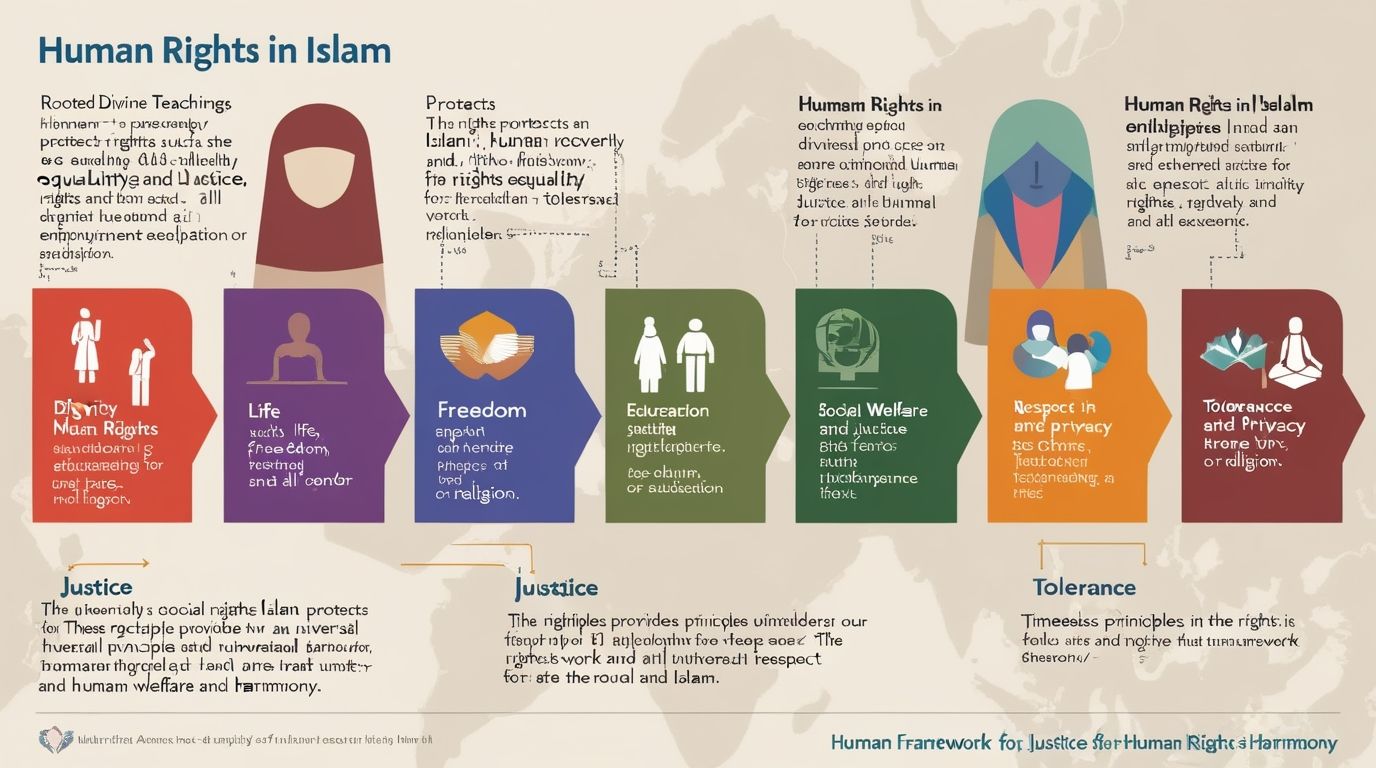Human rights are a cornerstone of all society, ensuring dignity, justice, and equality for all. Islam, as a comprehensive way of life, introduced a robust framework of human rights over fourteen centuries ago, grounded in divine principles and moral imperatives. These rights transcend time and geography, offering a universal model for human welfare. This essay explores the concept of human rights in Islam, detailing its foundational principles, specific rights, and its relevance in the contemporary world.
Foundational Principles of Human Rights in Islam
Islam’s emphasis on human rights stems from its belief in the inherent dignity of all human beings. The Qur’an declares:
“We have certainly honored the children of Adam…” (Qur’an 17:70).
This verse affirms the sanctity of human life and establishes equality as a divine mandate. Unlike systems rooted in human legislation, Islamic human rights derive their authority from Allah, ensuring their immutability and universality.
Key principles underlying Islamic human rights include:
- Equality: All individuals are equal before Allah, regardless of race, color, or social status. An Arab has no superiority over a non-Arab, nor does a non-Arab have any superiority over an Arab; a white has no superiority over a black, nor does a black have any superiority over a white, except by piety and good action.”
- Justice: Justice is a core value in Islam, extending to all aspects of life. The Qur’an commands:“Indeed, Allah commands you to render trusts to whom they are due and when you judge between people to judge with justice…” (Qur’an 4:58).
- Accountability: Islam holds individuals accountable for their actions before Allah, fostering a sense of moral responsibility toward others.
Specific Human Rights in Islam
Islamic teachings encompass a wide range of human rights that address individual and collective well-being. These include:
1. Right to Life
The right to life is inviolable in Islam, except in cases of justice. The Qur’an states:
“Whoever kills a soul unless for a soul or for corruption … it is as if he had slain mankind entirely…” (Qur’an 5:32).
This underscores the sanctity of life and the severe consequences of unjust killing.
2. Right to Freedom
Islam champions freedom of belief, expression, and action within ethical boundaries. The Qur’an asserts:
“There shall be no compulsion in [acceptance of] the religion…” (Qur’an 2:256).
This principle promotes religious tolerance and coexistence.
3. Right to Justice
Justice is a divine obligation. The Qur’an instructs:
“O you who have believed, be persistently standing firm in justice, witnesses for Allah, even if it be against yourselves or parents and relatives…” (Qur’an 4:135).
This ensures fairness irrespective of personal biases or relationships.
4. Right to Equality
Islam rejects all forms of discrimination. The Qur’an repeatedly emphasizes that piety and righteousness, not race or lineage, determine a person’s worth:
“Indeed, the most noble of you in the sight of Allah is the most righteous of you…” (Qur’an 49:13).
5. Right to Education
Education is a fundamental right and obligation in Islam. Prophet Muhammad (PBUH) said:
“Seeking knowledge is an obligation upon every Muslim.” (Sunan Ibn Majah).
This encompasses both religious and worldly knowledge, empowering individuals and communities.
6. Right to Privacy
Islam respects individual privacy and prohibits unwarranted intrusion. The Qur’an warns:
“Do not spy or backbite each other…” (Qur’an 49:12).
7. Right to Property
Islam safeguards property rights, recognizing lawful ownership and prohibiting theft, fraud, or exploitation. The Qur’an commands:
“Do not consume one another’s wealth unjustly…” (Qur’an 4:29).
8. Rights of Women
Contrary to misconceptions, Islam grants women numerous rights, including inheritance, education, and participation in social and economic activities. The Qur’an declares:
“And for women is a share of what the parents and close relatives leave, be it little or much…” (Qur’an 4:7).
9. Rights of Non-Muslims
Islam guarantees the rights of non-Muslims under its jurisdiction, including freedom of worship and protection of life and property. Prophet Muhammad (PBUH) stated:
“Whoever kills a non-Muslim under covenant will not smell the fragrance of Paradise…” (Sahih Bukhari).
10. Right to Work and Welfare
Islam emphasizes the dignity of labor and social welfare. It encourages equitable distribution of wealth and care for the needy through mechanisms like zakat and sadaqah. Prophet Muhammad (PBUH) said:
“The upper hand (giver) is better than the lower hand (receiver).” (Sahih Bukhari).
Islamic Institutions for Upholding Human Rights
Islamic governance and social systems are designed to uphold these rights. Institutions like the judiciary ensure justice, while zakat (obligatory almsgiving) addresses economic disparities. The concept of shura (consultation) in decision-making embodies democratic values.
Challenges and Misconceptions
Despite Islam’s comprehensive human rights framework, misconceptions persist due to cultural practices and selective interpretation of Islamic teachings. For instance, gender inequality and intolerance are often mistakenly attributed to Islam when they stem from societal norms.
Additionally, the geopolitical landscape and media portrayal of Muslims have contributed to the misrepresentation of Islamic principles.
Relevance in the Contemporary World
Islam’s emphasis on human dignity, equality, and justice resonates with contemporary human rights ideals. Its holistic approach addresses both individual and collective needs, offering solutions to modern challenges like poverty, inequality, and social fragmentation.
For example, the prohibition of exploitation and the promotion of economic justice in Islam align with Sustainable Development Goals (SDGs). Similarly, Islamic teachings on environmental stewardship contribute to global efforts for sustainability.
Conclusion
Human rights in Islam are deeply rooted in its divine teachings and ethical principles, offering a universal model for human welfare. By recognizing the inherent dignity and equality of all individuals, Islam provides a framework that transcends cultural and temporal boundaries. However, realizing these ideals requires adherence to authentic Islamic teachings and the elimination of cultural distortions.
In a world grappling with inequality and injustice, Islam’s timeless principles can serve as a beacon of hope and guidance, fostering a harmonious and equitable global society.

13 thoughts on “Human Rights in Islam”
Comments are closed.